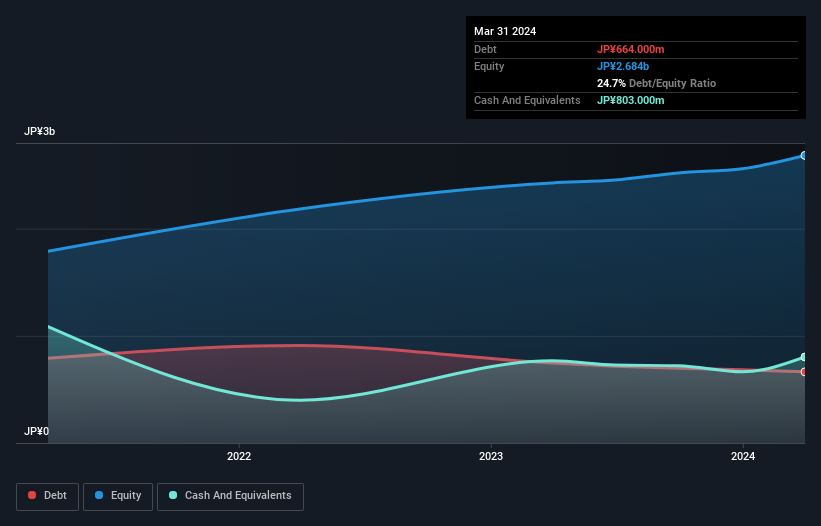Warren Buffett famously said, 'Volatility is far from synonymous with risk.' So it might be obvious that you need to consider debt, when you think about how risky any given stock is, because too much debt can sink a company. Importantly, DAIWA TSUSHIN Co., Ltd (TSE:7116) does carry debt. But is this debt a concern to shareholders?
What Risk Does Debt Bring?
Generally speaking, debt only becomes a real problem when a company can't easily pay it off, either by raising capital or with its own cash flow. Part and parcel of capitalism is the process of 'creative destruction' where failed businesses are mercilessly liquidated by their bankers. However, a more common (but still painful) scenario is that it has to raise new equity capital at a low price, thus permanently diluting shareholders. Of course, debt can be an important tool in businesses, particularly capital heavy businesses. When we think about a company's use of debt, we first look at cash and debt together.
See our latest analysis for DAIWA TSUSHIN
How Much Debt Does DAIWA TSUSHIN Carry?
The image below, which you can click on for greater detail, shows that DAIWA TSUSHIN had debt of JP¥664.0m at the end of March 2024, a reduction from JP¥746.0m over a year. But it also has JP¥803.0m in cash to offset that, meaning it has JP¥139.0m net cash.

How Strong Is DAIWA TSUSHIN's Balance Sheet?
According to the last reported balance sheet, DAIWA TSUSHIN had liabilities of JP¥743.0m due within 12 months, and liabilities of JP¥558.0m due beyond 12 months. Offsetting these obligations, it had cash of JP¥803.0m as well as receivables valued at JP¥793.0m due within 12 months. So it actually has JP¥295.0m more liquid assets than total liabilities.
This surplus suggests that DAIWA TSUSHIN has a conservative balance sheet, and could probably eliminate its debt without much difficulty. Simply put, the fact that DAIWA TSUSHIN has more cash than debt is arguably a good indication that it can manage its debt safely.
But the other side of the story is that DAIWA TSUSHIN saw its EBIT decline by 7.6% over the last year. That sort of decline, if sustained, will obviously make debt harder to handle. There's no doubt that we learn most about debt from the balance sheet. But you can't view debt in total isolation; since DAIWA TSUSHIN will need earnings to service that debt. So if you're keen to discover more about its earnings, it might be worth checking out this graph of its long term earnings trend.
Finally, while the tax-man may adore accounting profits, lenders only accept cold hard cash. While DAIWA TSUSHIN has net cash on its balance sheet, it's still worth taking a look at its ability to convert earnings before interest and tax (EBIT) to free cash flow, to help us understand how quickly it is building (or eroding) that cash balance. Looking at the most recent three years, DAIWA TSUSHIN recorded free cash flow of 45% of its EBIT, which is weaker than we'd expect. That's not great, when it comes to paying down debt.
Summing Up
While we empathize with investors who find debt concerning, you should keep in mind that DAIWA TSUSHIN has net cash of JP¥139.0m, as well as more liquid assets than liabilities. So we don't have any problem with DAIWA TSUSHIN's use of debt. When analysing debt levels, the balance sheet is the obvious place to start. But ultimately, every company can contain risks that exist outside of the balance sheet. We've identified 2 warning signs with DAIWA TSUSHIN , and understanding them should be part of your investment process.
When all is said and done, sometimes its easier to focus on companies that don't even need debt. Readers can access a list of growth stocks with zero net debt 100% free, right now.
New: Manage All Your Stock Portfolios in One Place
We've created the ultimate portfolio companion for stock investors, and it's free.
• Connect an unlimited number of Portfolios and see your total in one currency
• Be alerted to new Warning Signs or Risks via email or mobile
• Track the Fair Value of your stocks
Have feedback on this article? Concerned about the content? Get in touch with us directly. Alternatively, email editorial-team (at) simplywallst.com.
This article by Simply Wall St is general in nature. We provide commentary based on historical data and analyst forecasts only using an unbiased methodology and our articles are not intended to be financial advice. It does not constitute a recommendation to buy or sell any stock, and does not take account of your objectives, or your financial situation. We aim to bring you long-term focused analysis driven by fundamental data. Note that our analysis may not factor in the latest price-sensitive company announcements or qualitative material. Simply Wall St has no position in any stocks mentioned.
About TSE:7116
Slight risk with imperfect balance sheet.
Market Insights
Weekly Picks


Crazy Undervalued 42 Baggers Silver Play (Active & Running Mine)


Fiducian: Compliance Clouds or Value Opportunity?

Willamette Valley Vineyards (WVVI): Not-So-Great Value
Recently Updated Narratives

Watch Pulse Seismic Outperform with 13.6% Revenue Growth in the Coming Years

Significantly undervalued gold explorer in Timmins, finally getting traction

Moderation and Stabilisation: HOLD: Fair Price based on a 4-year Cycle is $12.08
Popular Narratives


MicroVision will explode future revenue by 380.37% with a vision towards success


NVDA: Expanding AI Demand Will Drive Major Data Center Investments Through 2026





